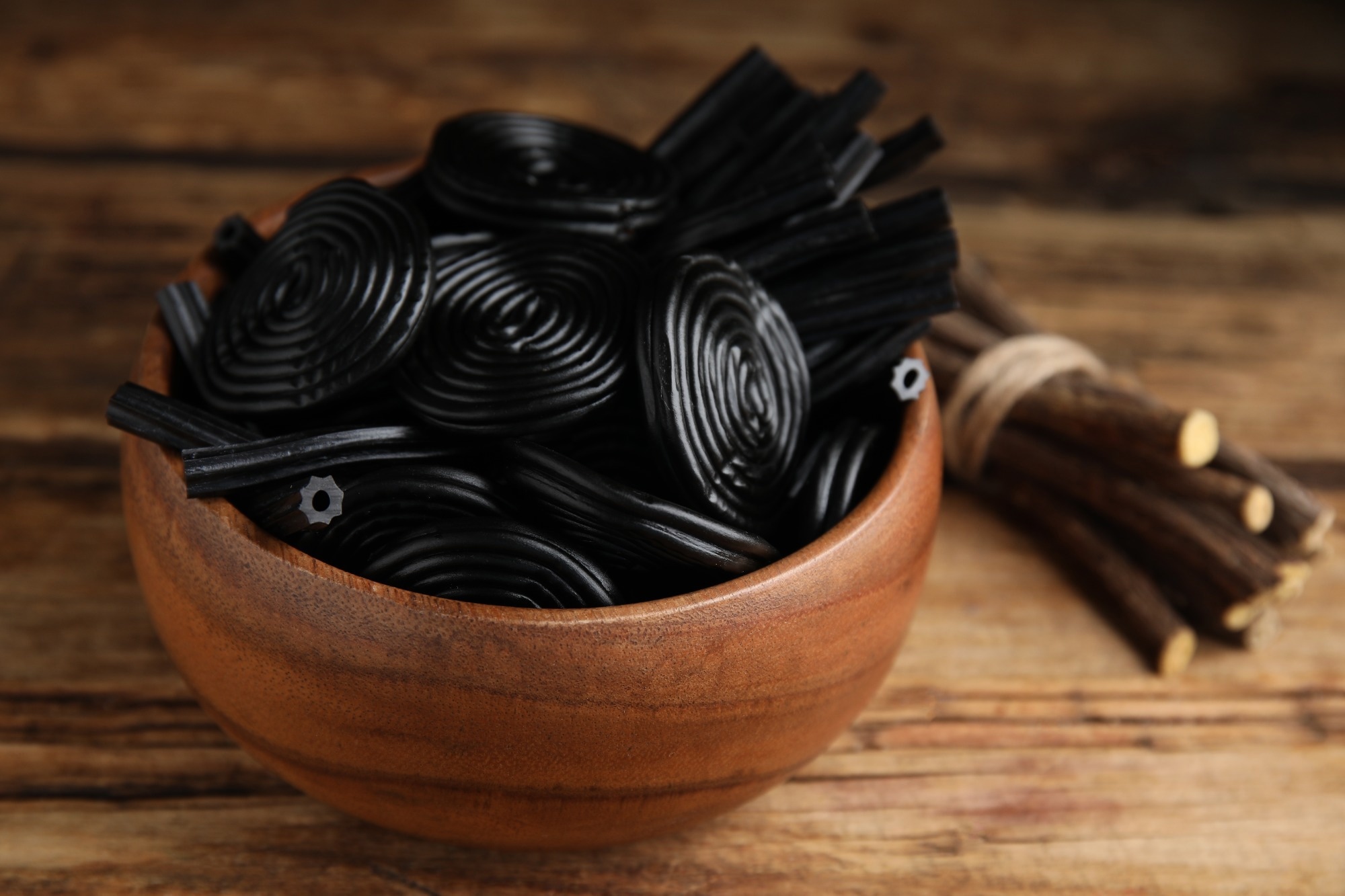Licorice has been used as a flavor and herbal medicine for centuries. Nevertheless, evidence suggests its intake could elevate BP through glycyrrhizic acid (GA). Ammonium chloride is an alternative to sweet licorice as it does not elevate BP and is marketed as salty licorice. The World Health Organization (WHO) and the European Union (EU) have suggested that ≤ 100 mg of GA per day is safe.
The GA content in sweet licorice varies by plant age, country of origin, species, and storage conditions. So far, 13 studies have been published on the effects of sweet licorice on BP, but none were randomized controlled trials. Therefore, it is unclear whether daily sweet licorice consumption is safe.
 Study: A low dose of daily licorice intake affects renin, aldosterone, and home blood pressure in a randomized crossover trial. Image Credit: New Africa / Shutterstock
Study: A low dose of daily licorice intake affects renin, aldosterone, and home blood pressure in a randomized crossover trial. Image Credit: New Africa / Shutterstock
About the study
In the present study, researchers examined the effects of daily consumption of sweet licorice on BP. Healthy volunteers aged 18–30 were recruited in Sweden between January and April 2023. Individuals with hypertension, eating disorders, drug or alcohol abuse, cardiovascular disease, headache, liver disease, peanut allergy, intolerance to licorice, and kidney disease were excluded.
The team implemented a two-treatment, two-sequence, two-period, non-blinded, crossover study design. Two groups were constituted – intervention then control (I-C) and control then intervention (C-I). Sweet licorice pastilles made from Glycyrrhiza glabra were used as the intervention. They contained 2% GA, 4% sugars, and 0.03% salt, as specified by the manufacturer.
Vegan salty licorice confectionaries, which contained 0.05% salt, 5.5% ammonium chloride, and no GA or sugars, were used as the control. Participants consumed 14.5 pastilles a day during the intervention and 2.9 g of salty licorice per day during the control period. Participants’ weight, height, and office BP were measured at baseline.
A questionnaire was administered to obtain information on age, sex, physical activity, alcohol or tobacco use, medications, heredity for cardiovascular disease and diabetes, and dietary supplements. Weight was also measured at the end of each period. BP was measured after a five-minute rest. Participants abstained from strenuous activity, caffeine, alcohol, and nicotine products at least one hour before measurements.
Baseline office BP was measured using a validated sphygmomanometer, and a semi-automatic device measured home BP three times in the morning and evening. Blood samples were collected at baseline and the end of the intervention, control, and first washout periods. Plasma sodium, creatinine, potassium, lipid profile, aldosterone, renin, and N-terminal prohormone of brain natriuretic peptide (NT-ProBNP) were estimated.
Findings
The study included 28 participants, with 14 females and 14 males equally represented in both groups. The average systolic and diastolic office BP levels were 109.1 mmHg and 65 mmHg, respectively. Compared to control, an increase in systolic home BP was observed during the intervention period. The systolic BP increased from day 5 until day 14 compared to three days before the intervention.
However, from day 11 of the post-intervention washout period, the systolic BP did not differ from that three days before the intervention. An increased diastolic home BP was observed from day 7 compared to three days before the intervention. The change in diastolic BP was not different between the intervention and control periods.
The diastolic BP was higher on day 14 of the post-intervention washout period than on the three days preceding the intervention. Aldosterone and renin levels declined at the end of the intervention compared to control. Body weight and NT-ProBNP levels increased, while creatinine declined during the intervention relative to the control period.
Values below the lower quantification level were observed for aldosterone and renin for a few participants. There were some protocol deviations; three participants did not take the sweet licorice pastilles on some days. During the intervention, one individual developed several itchy, red rashes around the thorax and upper legs that were resistant to treatment but subsided in the washout period.
Conclusions
Taken together, daily licorice consumption equivalent to 100 mg of GA increased home BP and suppressed aldosterone and renin levels. Licorice intake increased systolic BP from day 5 until day 14, suggesting that continued or prolonged intake might amplify this effect. Notably, the study was non-blinded, as taste differences between sweet licorice and confectionaries with ammonium chloride are noticeable.
To conclude, the findings reveal that licorice is more potent than previously known. Daily intake (100 mg GA) increased BP in young people. Further, the most sensitive quartile of individuals had elevated weight and markers of cardiac strain (NT-ProBNP). Overall, awareness of these effects is necessary given the everyday use of licorice, and more stringent warning labels are required for confectionaries containing GA.